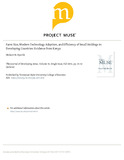Farm Size, Modern Technology Adoption, and Efficiency of Small Holdings in Developing Countries: Evidence from Kenya
Abstract
Low efficiency is a problem in most developing agriculture, and is one of the reasons for food insecurity. This paper provides information on smallholder production efficiency in one of the developing Sub-Saharan Countries: Kenya. It applies Data Envelopment Analysis (DEA) to farmlevel seasonal panel data. The estimated indexes indicate high levels of inefficiency between farm sizes, seasons, and adopters and non-adopters of ‗modern‘ farming technologies. A comparison of various farming practices shows that use of modern inputs and livestock-based capital could significantly improve farmers‘ performance. Tobit estimations show that the major factors influencing performance are the level of education, gender, market access and off-farm capital. Thus, policies aimed at improving education, rural infrastructure as well as assuring farmers of income through improved livelihood opportunities, and therefore reduced perceived uncertainty, could improve farm-level efficiency. The findings also provide support for prioritizing issues of farm production associated with women in policymaking
URI
http://hdl.handle.net/123456789/205https://muse.jhu.edu/article/440734
https://www.researchgate.net/publication/236698878_Farm_Size_Modern_Technology_Adoption_and_Efficiency_of_Small_Holdings_in_Developing_Countries_Evidence_from_Kenya
Collections
- Journal Articles (BE) [333]

